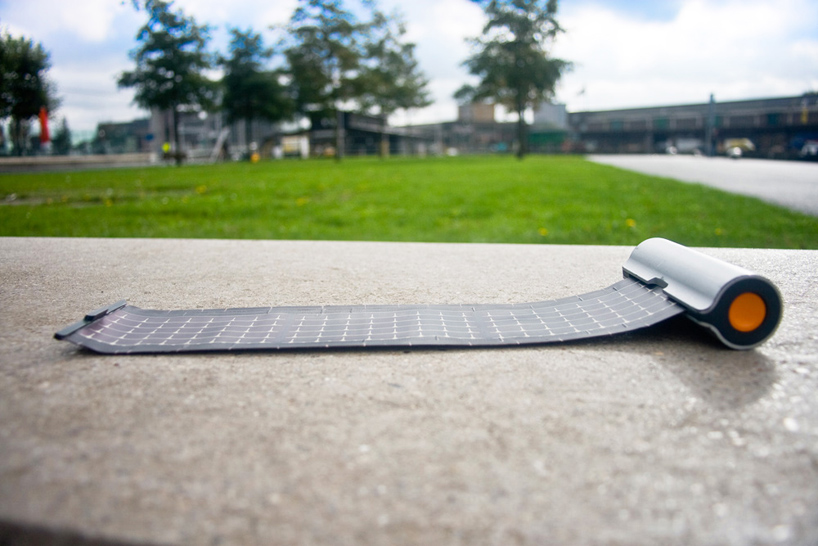
In their drive to make alternative energy more accessible and convenient, researchers and developers are always coming up with new applications. From coatings that make solar panels more efficient, to small-scale designs that allow for urban wind farms, and new manufaturing methods that allow for the cheap, mass production-friendly solar cells, there's always new and interesting things emerging from the field.
For example, portability is fast becoming an exciting trend with solar power - especially where flexible, rollable panels are concerned. And in that respect, WAACS - a Rotterdam-based consultancy studio - recently unveiled a rollable solar charger that makes green energy truly portable. Based on ancient papyrus rolls, the design incorporates a flexible solar cell that rolls up into a compact, lightweight aluminum container.
The device is small enough to fit into a bag and enables charging on-the-go, which removes the need for an electrical outlet. Simply unroll the solar pad, plug your device into the charger's USB outlet, and let photovoltaics take care of the rest. The panel is long enough to generate enough electricity to accommodate multiple devices, and a smart inner windup mechanism ensures that the panel can be easily rolled back up again.
In keeping with the company's commitment to designing better consumer products, this rollable solar charger was largely motivated by the desire to ensure that devices didn't run out of power while their owners in transit.
However, it is also keeping with the company's growing commitment to green technology, which can also be seen with their YouBeGreen - a smart energy monitoring platform that measures and regulates power consumption in laptops and personal computers.

The WAACS rollable charger allows consumers to utilize solar energy anywhere. Credit: waacs.com
And while this device may seem perfect for busy people who don't know when they might be able to charge their devices again, the technology is also likely to be extremely useful for people in the developing world. In places where access to electrical grids is problematic, or electricity is simply too expensive, rollable chargers could be a way of ensuring that devices remain operational.
In countries where cell phone usage, pay-as-you-go plans and installment options have helped millions of people circumvent the problem of not being able to afford landlines (or because phone services simply aren't available in their communities) a portable charger could also be the difference between remaining in contact with friends, family and services, and going off the grid.
Not surprisingly, this is not the first instance of a rollable solar charger on the market today. For example, Iowa Thin Film Technologies - a leading global developer and manufacturer of thin-film solar products and modules - recently released their Rollable Solar Powered Battery Charger. As part of series of rollable solar panels, this device utilizes flexible solar cells and a charging station to provide portable solar power, even in low-light conditions.
And then there's the Window Socket, a portable solar charger that attaches to windows or any-sun exposed surface via suction cups. Within 5 to 8 hours, its solar cells are apparently able to store enough electricity to power a device for up to ten hours. Created by Kyuho Song and Boa Oh of Yanko Design to resemble a normal wall outlet as closely as possible, this charger can be taken and used anywhere, making it truly versatile.
One of the greatest factors behind the growing usage and popularity of alternative energy is its range of applications. Thanks to innovation-driven designs and new concepts, people are now able to generate and harness clean energy just about anywhere. Because of the way this side-steps the need for outlets, grids, and expensive infrastructure, it also offers a degree of accessibility that conventional power does not.
Want to help make a difference? Then be sure to check out the Fuel Freedom Feulx Challenge and the TEN9 Challenge, two competitions focused on the promotion of alternative fuel and sustainable transportation.








